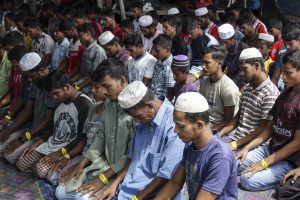While the world has its eyes on the ongoing war in Palestine, Indonesia has been facing a small crisis of its own with the arrival of nearly 900 Rohingya refugees to the country’s Aceh Province over the past week.
The conservative province, which is a special autonomous region and the only part of Indonesia to enact Sharia punishments, has famously been seen as a safe haven for the Rohingya, a mostly Muslim group from western Myanmar. But it seems as if Aceh may be a safe haven no longer.
Last week, three boats arrived in as many days, although only the first two, carrying over 300 refugees in total, were allowed to land on Aceh’s sandy beaches in Pidie District.
The arrival of a third boat, carrying some 249 refugees, and the ensuing response, which went viral after mobile phone footage of the scene was posted online, prompted accusations of heartlessness and questions about whether Indonesia has reached a breaking point.
When the boat arrived and the refugees, who had spent a month at sea, staggered onto the sand, they must have thought that they were safe. Unfortunately, locals who had gathered on the beach were unmoved by their plight and promptly paraded them back to their boat while handing out conciliatory food packets and water.
In protest, some of the refugees flung the handouts in the water, while begging to remain on dry land.
Once back on the rickety wooden boat that had somehow managed to carry them across the Andaman Sea from crowded refugee camps in Bangladesh, around a hundred refugees jumped into the water and swam to shore once again.
By this time, night had fallen, and locals on the beach illuminated the chaotic scene with the lights on their mobile phones as refugees were dragged into the surf and back to their boat. Some appeared so emaciated after weeks at sea that they could barely move.
It was anything but humanitarian.
In addition to being cruel, turning the third boat away also violated the principle of non-refoulement, a point of international law that forbids a country receiving asylum seekers from returning them to a country in which they would be in probable danger of persecution.
Importantly, non-refoulement would not only apply if Rohingya refugees were sent directly back to Myanmar, but also if they were sent elsewhere such as back to Bangladesh or to another country like neighboring Malaysia.
But even if refugees are allowed to enter Indonesia, it is only a temporary measure.
One of the issues is that the country is not a signatory to the 1951 Refugee Convention or the subsequent 1967 Protocol, which means that it is under no obligation to resettle refugees permanently in the country and currently has no mechanism with which to do so. Instead, Indonesia will however (usually) allow refugees to land in the country and provide some support such as shelter, food, and a small stipend, which is usually facilitated under the umbrella of groups such as the International Organization for Migration and the United Nations High Commissioner for Refugees.
But refugees are not actually allowed to enter Indonesia and live in the country legally.
An imperfect analogy, which misses some of the nuances of a person fleeing persecution, would be an individual flying from London to New York with a stopover in Paris.
Once off the plane from London at Paris Charles de Gaulle Airport, the person is then in no man’s land. As long as they don’t go through passport control, they are not in France. They are also no longer physically in the United Kingdom and not yet in the United States. They have not legally entered France, but they are allowed to stay in the airport, technically on French soil, but in a transit zone.
So it is for refugees in Indonesia, who are considered to be in transit for the duration of their time in the country. Legally, they have no right to work while they are in Indonesia and adults have no right to education, although some children have been allowed to go to local schools in recent years. They must thus remain in transit, or in legal limbo, until they are permanently resettled in a new country, but that often takes over a decade, if it happens at all.
Back on the beaches of Aceh, the third boat which was turned away was able to land several days later, along with two more boats, in a different district.
In total, over 840 Rohingya refugees landed in Indonesia within the space of a week.
A sudden influx of over 800 people anywhere would raise questions about the handling of such a large-scale humanitarian crisis but, with the tensions seen last week and the already tense relationship between Indonesia and refugee legislation, one has to wonder how it will end if more boats arrive on the horizon.

































